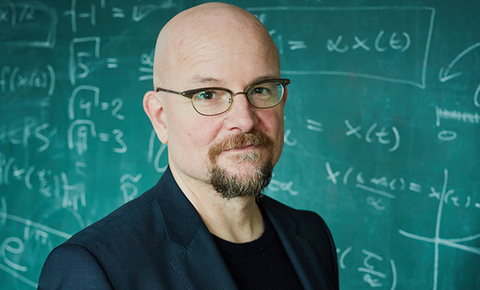Oct 13, 2025
Making complexity research easy to understand: Dirk Brockmann received award from the International Society for Artificial Life
Prof. Dirk Brockmann, Director of the Center Synergy of Systems (SynoSys) at TUD Dresden University of Technology, has received the Education and Outreach Award from the International Society for Artificial Life (ISAL). The award recognizes his project “Complexity Explorables”. The interactive online collection makes central models of complexity science understandable, such as traffic jams or herd immunity. The award ceremony took place during the ALIFE 2025 conference in Kyoto.
From biology, physics, and mathematics to epidemiology, social sciences, and neuroscience: Prof. Dirk Brockmann's “Complexity Explorables” project now comprises almost 50 models of complexity research. Each of the “Explorables” combines a brief introduction with a dynamic simulation that users can control themselves. In this way, phenomena such as swarm behavior or filter bubbles in social networks can be explored in an intuitive way.
“The biggest communication challenge in complexity research is that the models are very presuppositional. With the Explorables, I want to break down these barriers and enable people to experience complex systems through direct interaction,” says Brockmann, describing his motivation. The aim of the platform is therefore to make scientific models accessible without mathematical hurdles and to make them available to a broad public.
Since their launch in 2017, the Complexity Explorables have been used worldwide, for example at universities such as the Santa Fe Institute (USA) or the Complexity Science Hub Vienna. They are also applied in schools and in popular science formats.
The annual ISAL Awards recognize outstanding contributions to Artificial Life research. Awardees are nominated through an open process and selected by international expert committees. As the jury stated: “This website is full of interesting and engaging teaching materials related to various subfields of artificial life. It is clearly polished and professional and would be valuable for more of the alife community to be aware of.”
The award also highlights how closely Brockmann's work at the Center Synergy of Systems is linked to innovative science communication. SynoSys, which he founded at TU Dresden in 2023, develops transdisciplinary approaches and methods in the fields of network science, data science, digital science and citizen science with the aim of conducting integrative research into complex phenomena at the interfaces between biomedicine, social sciences and life sciences. The focus is on dynamic phenomena such as pandemics, chronic diseases, mental health, planetary health. SynoSys is not only a think tank – it’s also a “link tank” that teaches early career researchers about complexity research and science beyond disciplinary boundaries

